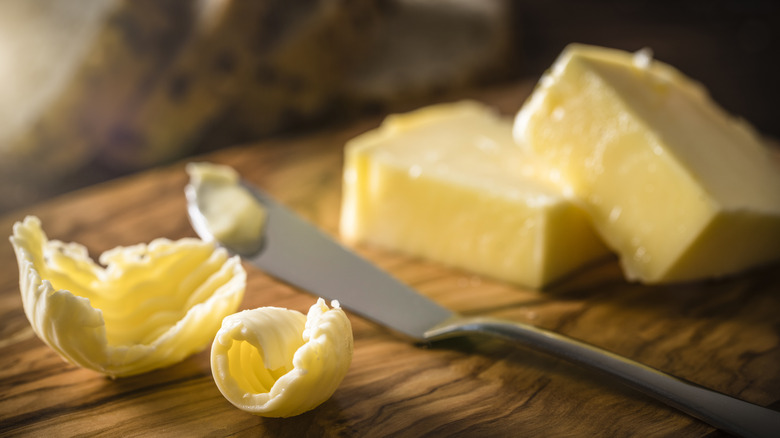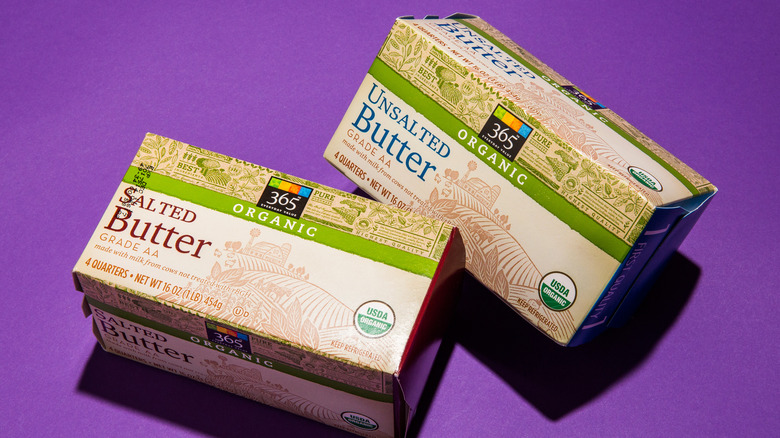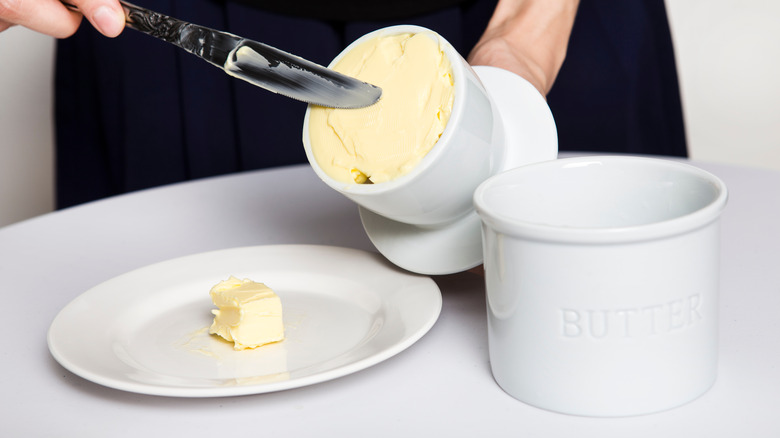Why Salted Butter Is Safer To Leave Out On The Counter Than Unsalted
Keeping butter out on the counter is common practice for many of the daily toast and jam set. After all, who wants to rip a perfect slice of bread in half with a chunk of ice-cold butter? But fears of spoilage have turned many away from the ease of the pantry butter dish or the decorative butter bell. Officially, the USDA recommends eating unrefrigerated butter within a day or two, more for flavor reasons than because of health risks. But you're probably fine for a couple of weeks, particularly if you pay attention to which butter you're leaving out.
Different kinds of butter react differently to being left at room temperature. Margarine, aka vegan butter aka not real butter, can't be left out, as the oil and water in it will separate and become unsavory. But when it comes to the real thing, salted butter is your best bet, because the salt in it protects it against bacteria. Unsalted butter doesn't have this added armor, so it's better to leave it in the fridge.
Salted vs. unsalted
Salt limits microbial growth by reducing the water content in certain foods. And butter's low water content is actually what makes it more shelf-stable than other dairy products, so the compounding effects of salt on butter's already stable microbiome make it even less likely to spoil. So ditch the unsalted butter if your major concern is a long pantry life.
The thing is, there's no reason you should be keeping unsalted butter out anyway. Salted butter is almost always going to be your go-to for toast, eggs, a bowl of rice, or a crispy-skinned filet of salmon. The only thing you really need unsalted butter for is baking. And as all bakers know, a lot of the time, that butter needs to be cold. For fluffy biscuits or flaky pastry, cold butter is ideal for creating crispy layers. And even then, you can probably use salted butter anyway, and simply omit the added salt required by the recipe. We promise, no one will know.
Other butter storage tips
So once you've got your salted butter, you'll want to keep it in a cool, protected place, even if that place isn't your butter shelf in the fridge. Keeping it in a butter dish or butter crock will help it keep for longer by shielding it from contaminants in the air. You should also avoid leaving it out on hot days when temperature spikes could get the best of it. And don't feel like you need to leave the whole stick out if you aren't going to use it in the near future. Put half of it back in the fridge if you need to. You can even freeze it if you have more butter than you know what to do with!
And if maintaining softness in your butter is your primary concern, you may want to consider switching from American butter brands to European ones. European-style butter like Kerrygold or Isigny Sainte-Mère has a higher fat content than American-style butter. The result is a wonderful flavor, as well as a distinct difference in texture: European-style butter softens much faster than American-style butter. So you can keep it refrigerated and pull it out ten minutes or so before you plan to use it for ideal results. (Or just soften your butter with your oven's residual heat.)



